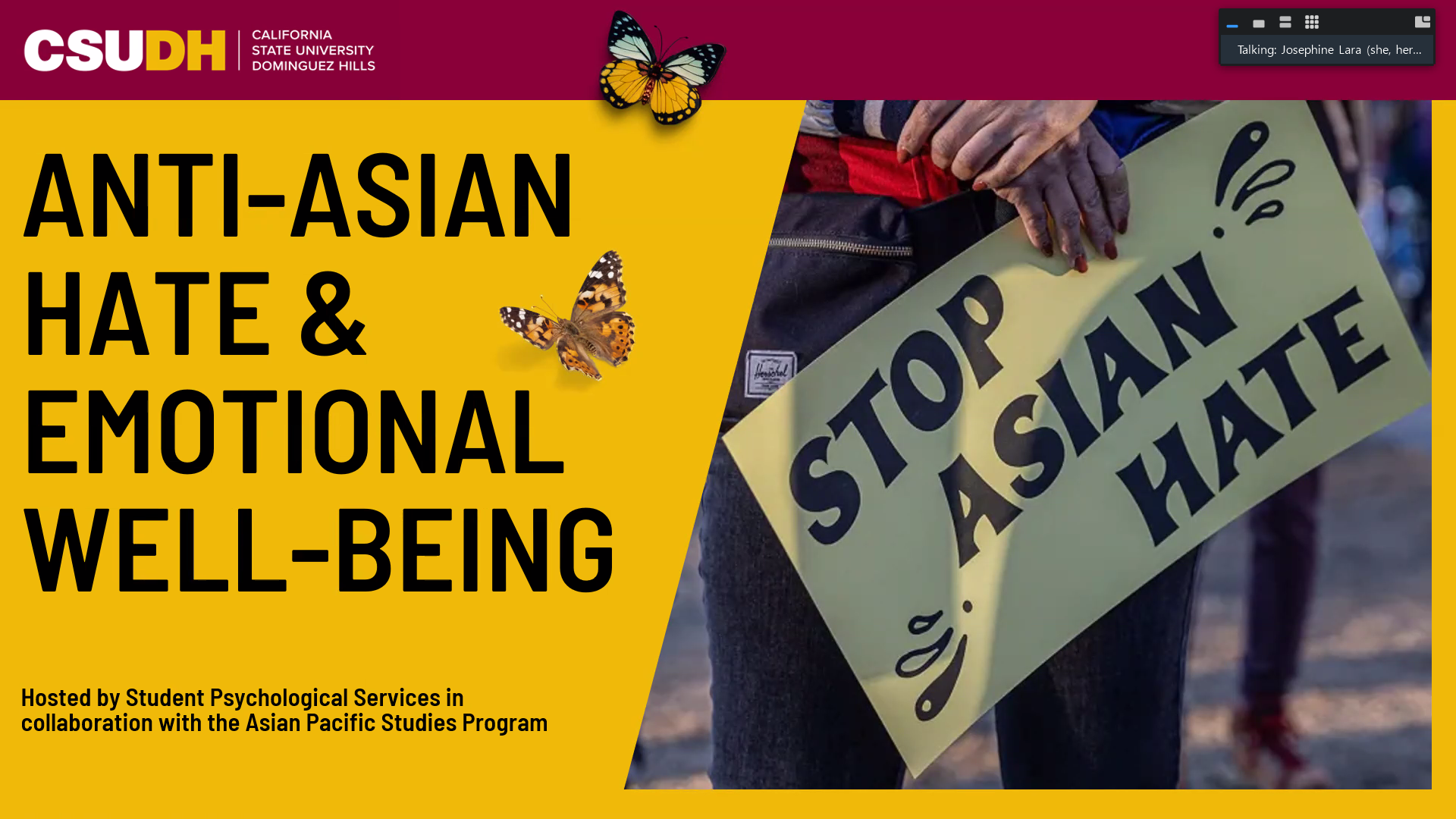With recent events in mind like the Atlanta Shooting, SPS and the Asian Pacific Studies Program provided a virtual healing session for AAPIN students. Screenshot by Anthony Vasquez.
By Anthony Vasquez, Assistant Section Editor
Asian hate crimes have been at the epicenter of the former and present year. These types of crimes increased in numbers during the pandemic relating to xenophobia and bigotry towards AAPINH communities.
Stop AAPI Hate, an online resource started by the Asian Pacific Planning and Policy Council (A3PCON), Chinese for Affirmative Action (CAA), and the Asian American Studies Department of San Francisco State University have collected data reporting 3,795 incidents within March 19, 2020, and Feb. 28, 2021. Along with Stop AAPI Hate, the Center for the Study of Hate and Extremism found an increase in hate crimes by 149% in 16 of the United States’ largest cities.
But the numbers only account for crimes that have been reported and the actual number is said to be much higher.
In response to these events and the rise in crime, Student Psychological Services and the Asian Pacific Studies Program hosted their first virtual healing session of a two-day event last Thursday, April 29. With May just around the corner, the event served as a segway into Asian American and Pacific Islander Heritage Month and Mental Health Awareness Month.
The first session of the event served as an open invitation to provide a safe space for Asian American, Pacific Islander, and Native Hawaiian (AAPINH) students only. Their reason for this is to make it as intimate and private as possible to solely focus on the voices and needs of AAPINH with recent events in mind. The session would be led by psychologists of Student Psychological Services and professors and lecturers from the Asian Pacific Studies Program.
The session included a variety of breathing exercises and relaxation exercises. It also touched on trigger warnings and encouraged participants to turn on their cameras to help build a sense of identity, community, and togetherness.
“The first step out of darkness is the intention to find the light to imagine and invite to drive into sight and as you set out in your journey and your healing path begins you take a step into your power for your magic lies within,” was a poem read by the poet, D.L. Gould, that was shared with attendees in relation to the process of healing.
One of the psychologists shared there’s research that suggests racist experiences directly impact people’s bodies both physically and mentally. This includes higher levels of blood pressure being present in people of color leading to more chronic diseases, as well as higher levels of anxiety, depression, hypersomnia, and insomnia that result from racism.
After providing this information, participants were asked to share their experiences. Attendees shared experiences relating to verbal, physical, and online abuse that dated back to post and pre-pandemic that not only affected them but family members as well. They also expressed instances of having to feel the need to hide their identities by disguising themselves to avoid being targeted and also shared moments of standing up against racism.
Out of respect to the students and members who attended the space, The Bulletin will refrain from any mentions of names or explicit details of the experiences participants shared.
After sharing, another psychologist resonated on these experiences as unfortunate as they create feelings of unwantedness and contribute to the othering of people of color. They also offered coping mechanisms and ways to handle these traumatic experiences, such as engaging in spiritual practices, venting, and reminding oneself to make time and engage in de-stressing activities.
While the session was meant to prioritize AAPINH students, students who were not AAPINH were also in attendance and voiced their allyship and their own experiences relating to hate crimes and racism.
SPS and the Asian Pacific Studies Program will be hosting their second healing session open to all students on May 6. To register, click here.
For more information and updates on SPS or the Asian Pacific Studies Program, follow their social media platforms here:
Student Psychological Services
Twitter: @torowellness
Instagram: @torowellness
Facebook: CSUDH Psychological Services
Asian Pacific Studies Program
Instagram: @asianpacificstudiesFacebook: Asian Pacific Studies Program at CSUDH

